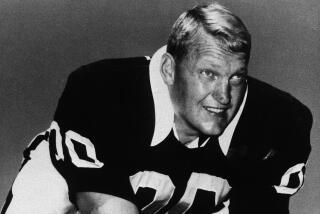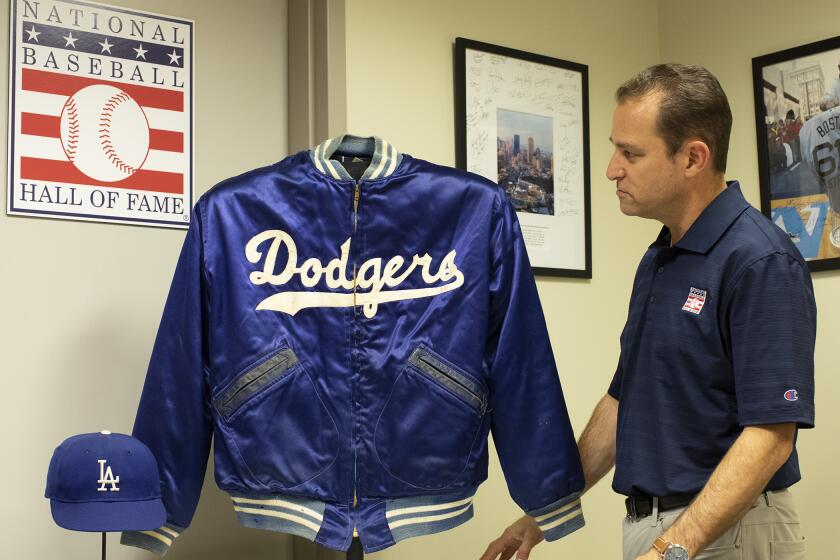For Abbott, Break Was Clean
- Share via
I wondered if Jim Abbott holds any sympathy for today’s ballplayers, given that so many are unable to play the game without a crutch.
How fortunate he must consider himself, I thought, born so strong and determined, and to have pitched 10 major league seasons with such grace and humility.
In a flawed world, some people get all the breaks.
He was making plans Friday to leave for a vacation to his home state of Michigan, where he and his wife and two daughters spend their summers. His parents still live there, still healthy and working. Retired from baseball for seven years, he raises his children, gives speeches, sees to his charities and plays golf with former teammates.
He also reads the paper, following the game and its recent drug-related issues. He recalled, with a light laugh, the right-handed hitters who’d go upper deck, opposite field, against him. He had no idea.
“There’s a desperation to that life,” Abbott said. “So much about it is who you are. You grew up being a baseball player. To be faced with not playing, moved out of the game, it’s really frightening. I try not to be judgmental.”
By the end of his career, he’d sat out a season and been released twice.
“I never did it,” he said. “I was never offered it. I was naive about its use. I’ll say that I’m really glad, at the end of my career, when I desperately needed velocity, that I knew nothing about it. I’d like to think I would have made the right decision. I really do. I didn’t want to clean out my locker in front of all my friends. I didn’t want to feel that hurt, that pain. Those are tough decisions.
“I’m sure I would have done the right thing.”
Fifteen springs ago, I sat in the bleachers behind home plate in a small Arizona ballpark. Abbott was pitching and -- there’s no way to put this nicely -- he was getting hammered. Every ball he threw found a bat barrel.
The hitters gathered such confidence they all but grinned when Abbott went into his deliberate delivery.
Young women watched through tears, the afternoon long before having gone blurry on them.
Grown men threw their hands in the air, celebrating every hit, every batter’s delight as another light thud sent another ball spinning through the infield.
It was so hot that the sun seemed to have set atop the backstop. Abbott had sweated through his jersey before the first inning was done. He threw 20 pitches, then 30, then 40. He couldn’t keep his fastball out of the middle of the plate.
The best game I ever saw him pitch.
When it was done, the parents of the opposing lineup stood and applauded. They, too, were exhausted, having pushed wheelchairs around the bases all afternoon. Some had held their boys’ hands as they lugged leg braces from third to home on a grounder to shortstop, as the pitcher cheered.
Abbott would finish third in the Cy Young Award balloting that season, when his earned-run average was 2.89. He was 23 years old. The ball felt light in his hand. From the perspective of that diamond, that day, and then of many subsequent diamonds on many days, his career looked endless.
Abbott took the ball in 1989. He gave it back in 1999, reluctantly. In that time, he won 87 games, 18 in one season for the Angels. He also lost 108 games, yes, 18 in one season for the Angels. He threw a no-hitter for the New York Yankees in the fall of 1993.
By the end, however, and barely into his 30s, the beatings would hardly stop. His fastball was gone. The strain was enormous. Abbott, so prideful, would sit in front of his locker, slumped over and wounded by another failed start.
He was not always above the desperation.
“I let it define me,” he said. “You could look back and try to understand what sports meant to me, what it brought me as a kid, how I became accepted.
“When I encountered failure, I struggled with it. I really took it hard. It did affect me. It took a personal toll to come to the realization that this is who I am. And that people didn’t care. I thought every time I walked into a restaurant people were saying, ‘He’s 2-18.’ It wasn’t the case.”
Maybe it was, and maybe that was part of Abbott’s victory. He’d taught us to judge him as a baseball player by the way he pitched. He’d shown us we owed him that.
Now, we don’t know how to evaluate players, not without running a urinalysis first. For those who knew too much to make the right decision, who couldn’t take the pain of leaving the clubhouse before they were ready, Abbott does feel sympathy.
“In a philosophical way, I do,” he said. “I think it will torment them. I think there are sensitive players out there who will have to live with it. There is a price to pay that is quiet. Then, I do think there are guys who are laughing about it, who know they got away with it, and that bums me out.”
They start with perfect bodies. Some start with Hall of Fame careers. They had respectable work ethics, bulging bank accounts, the admiration of a nation that adores their sport.
Then they decided it wasn’t enough.
So, I asked, do their shortcuts repulse you?
Given, you know ...
“No, I never viewed myself as that,” he said. “I was blessed with a lot of ability. If anything, I look back and wonder if I made the most out of it, if I got all I could out of myself. I wonder, ‘What more could I have done with my left hand?’ ”
More to Read
Go beyond the scoreboard
Get the latest on L.A.'s teams in the daily Sports Report newsletter.
You may occasionally receive promotional content from the Los Angeles Times.










